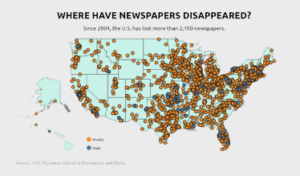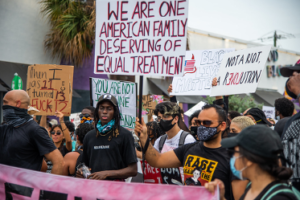What do Glennville, Georgia, and Youngstown, Ohio, have in common? The small town in the Deep South and the mid-sized Midwestern city both have lost their sole local newspapers in recent years.

What do Glennville, Georgia, and Youngstown, Ohio, have in common? The small town in the Deep South and the mid-sized Midwestern city both have lost their sole local newspapers in recent years.


When I was five years old, I announced my new discovery: “Negroes (the polite term at the time) are bad.” My parents tried to correct me, but I felt my logic was unshakable: When the radio reported a crime, the perpetrator was often black. They never said that a suspect was white. I didn’t know any black people in our segregated town, but I knew many white people, and none of them were criminals. This was an open-and-shut case in my five-year old’s mind.
A few weeks later, my father took me downtown to see a parade. He struck up a conversation with a black woman we were standing next to. She had a baby, who captured my interest, though I was more entranced by her Kraft Caramels (my favorite candy at the time) she shared generously with me. This, of course, completely shattered my baby bigotry.
When I was approaching middle age, I reflected on the incident. Only then did I realize that when I was young, parade-viewing areas – as well as everything else – were strictly segregated in Enid, Oklahoma. It must have taken some planning and more than a small amount of courage to arrange for us to stand in the “colored area” next to a friendly woman who just happened to have a cute baby and my favorite candies.
The issue of race did not come up often in our small, mostly white town (at least not in the white community), so I had little need to reflect on what I had learned until Emmett Till’s murder on August 28, 1955, made national news and provoked national outrage.